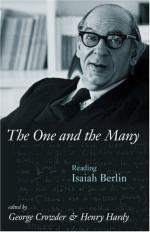|
This section contains 3,715 words (approx. 13 pages at 300 words per page) |

|
SOURCE: “On Isaiah Berlin,” in Partisan Review, Vol. LIX, No. 2, Spring, 1992, pp. 309-15.
In the following review, Sidorsky examines Berlin's concept of pluralism.
There is an old dogma which can be traced back before Aristotle's argument with the Platonists to the conflict between followers of Parmenides and of Heracleitus that all philosophers can be divided into two camps: monists who are the champions of the One and pluralists who are the champions of the Many. This doctrine rises to the stature of an aphorism only with its topping and undercutting conclusion that all historians of philosophy can be divided into two groups: those who believe that all philosophers are either monists or pluralists, and those who do not. The recurrent theme of Isaiah Berlin's new collection of essays, The Crooked Timber of Humanity, sketching the career of ideas that have shaped modern politics, particularly some of its most...
|
This section contains 3,715 words (approx. 13 pages at 300 words per page) |

|


